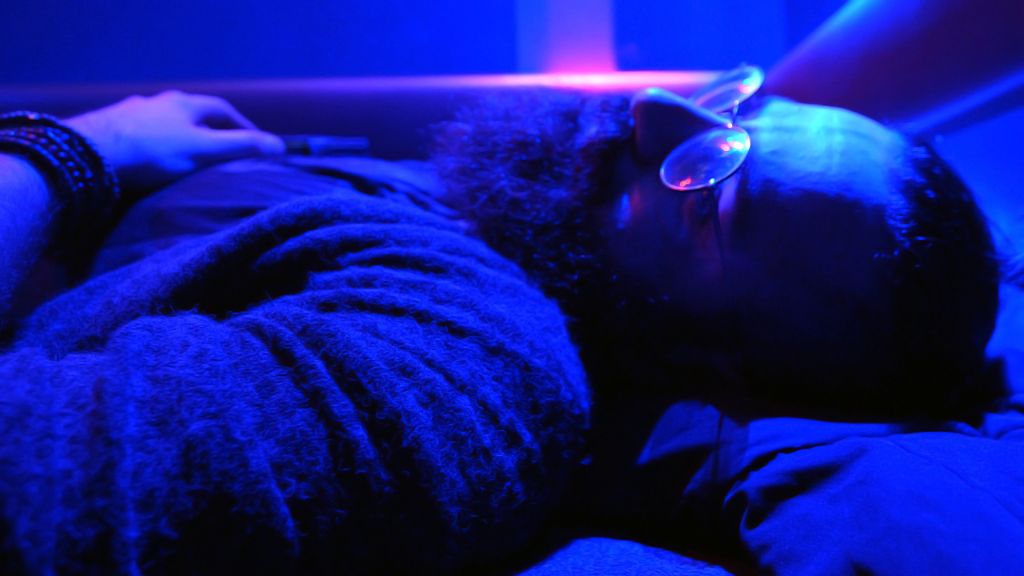
The German-born, New York-based filmmaker Till Schauder‘s previous film The Iran Job was about an American basketball player who went with great trepidation to play professionally in Iran, a winning film about sports, politics, and the people of that country. It makes for a good segue to his new film, which is in many ways more complex and fraught with peril — When God Sleeps.
The story of Iranian musician Shahin Najafi, who was forced into hiding after hardline clerics issue a fatwa for his death, incensed by a rap song that focuses on the oppression of women and human rights abuses. Risking his life every time he steps on a stage, Shahin refuses to stop performing.
“Schauder makes the most of Najafi’s troubled situation, ratcheting up the paranoia and pressure-cooker atmosphere,” wrote Anthony Kaufman in Screen Daily. It “becomes more a portrait of a political activist than a musician, asking familiar, but very resonant questions about the costs of resistance.”
Schauder talked to us about the risks in and power of making this tense film.
Why did you want to make a film about Shahin Najafi’s story?
In the current global discourse over religion, assimilation, culture clash and religious conflicts, a number of complex questions are ripe for exploration: What are the limits of freedom of speech? Should there be limits at all? If Islam is defined as a modern, tolerant and peaceful religion, why are people being killed in its name? Do Muslims who immigrate to Western countries have a responsibility to assimilate to Western values?
What are the responsibilities of countries that take in Muslim immigrants and refugees? What is the role of Islamic and other religious leaders in the current climate? How much of the debate is dictated by Islamophobia and racism – and how much of it by political correctness?
Similar to Salman Rushdie’s story, Shahin’s story unfolds on the treacherous battlegrounds of power, religion, and artistic and political freedom. In light of the ongoing worldwide conflicts over freedom of speech and the oppression of political and religious dissenters, there seems no better time to tell this story than now.
Obviously, the hope is that this film has wide appeal, but who do you hope it reaches and affects the most?
Anyone who’s afraid to express their opinion; anyone who thinks their voice has no impact; anyone who feels too lethargic to challenge an oppressive status quo, which is nowhere more relevant than in our country given the moral and political decay under the current administration.
There must have been quite a few challenges in making When God Sleeps–what were some of the biggest?
Filming with someone who has a bounty on his head presents endless logistical and creative challenges (e.g. we could never shoot with a full crew on any outdoor locations for fear of calling attention to our subject); It is also quite stressful psychologically.
How did you get Najafi and his close circle to trust you in telling this tense story?
Shahin saw and liked our previous film The Iran Job, which was filmed in a very similarly intimate style. Additionally, we had several “warm-up shoots” to get acquainted with one another.
Was there anything you wish you could’ve included in the film but just couldn’t make the final cut?
More of the problematic/abusive sides of Shahin’s character (which have little or nothing to do with the pressure that the fatwa put on him). This would’ve made for an even more complex character study. However, we needed to strike a balance between representing him accurately and also likable enough for the audience not to dismiss him.
What’s your favorite scene (if you could only pick one) in When God Sleeps?
The scene when Shahin breaks down after his best friend and confidant quits the band, after recurring threats by terrorists to target a concert.
How was Najafi himself to work with?
To his credit, Shahin warned me of himself. He asked me repeatedly, “Are you sure you want to make a movie about me – I’m not easy to work with. I’m crazy.” I appreciated this honesty and he certainly didn’t exaggerate. But I also dismissed his concerns comparing his difficult personality with that of actors like Klaus Kinski who famously (or so the legend goes) put a gun on Werner Herzog’s head in the jungle while they were filming “Aguire”. Shahin never put a gun on my head, but he did once spray me with his maze (which is the tamest of the various weapons he keeps for protection) from very close range wrecking my eyes for the rest of that particular shooting day.
And do you have any updates on his situation that you can share with us?
Shahin has relocated to London. Last I heard he’s looking to finally marry Leili there. I hope it happens and wish them all the best.
What are your three favorite/most influential documentaries or feature films?
Feature Films: Harold & Maude; The Discreet Charm of the Bourgeoisie, Blue Velvet; For docs, so many, but I [especially] liked: The Two Escobars, Grizzly Man, Quest.
Can you tell us anything about projects you’re working on next?
Currently finishing up The Reggae Boyz about soccer and music in Jamaica and how both help to curb the rampant gun violence in the country.

